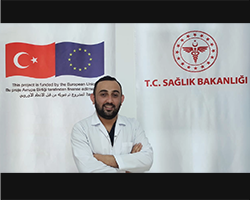Personal story - “Completing my training and working in the Turkish health care system has changed my life” – Doctor Ramy Sheikh Muhammed

WHO
When the war broke out in Syria, Doctor Ramy Sheikh Muhammed had to cut short his medical training in Aleppo. Away from his village, his parents and his siblings, he was not able to return there when fighting intensified and civilians in the city found themselves under constant fire. He had no choice but to leave Syria and his family behind to seek refuge in Turkey.
Dr Muhammed now works as a physician at the Refugee Health Training Center in Ankara. Upon arriving in Turkey in 2014, he strived for three years to make a living through writing health-related content for websites. Then he heard about an opportunity to work within Turkey’s health care system, as part of the European Union-funded “Improved access to health services for Syrian refugees in Turkey” project.
“It was here, in the Turkish health care system, that I began to work as a doctor for the first time, after completing my training, and it changed my life,” Dr Muhammad explains. “The project gave me hope for a brighter future, restored my confidence, and helped me financially”, he adds.
Providing health services during the pandemic
Dr Muhammed is one of the health workers on the front line in the COVID-19 pandemic in Turkey. When the first positive case in Turkey was officially announced in March 2020, he participated in training specifically designed to equip health workers to respond to the pandemic. He learned to perform PCR testing, to communicate with patients about prevention methods such as physical distancing, mask wearing and hygiene, and to care for COVID-19 patients.
Like many other frontline health workers, Dr Muhammed became infected with COVID-19 during the pandemic. Once he recovered, he returned to his job at the Refugee Health Training Center to continue to provide essential health care services to refugees and to support the ongoing response to the pandemic.
Rebuilding a life
WHO and the Ministry of Health of Turkey, with funding provided by the European Union, work together to support the integration and adaptation of Syrian health workers like Dr Muhammed into the Turkish health system by providing continuous medical education and training.
After being interviewed, Dr Muhammed attended various theoretical and practical medical training sessions before starting work within the Turkish health care system. Some of the on-the-job training he received included sessions on mental health, reproductive health, occupational health, and noncommunicable diseases.
“I believe that attending these trainings sessions allows us to continuously consolidate and advance our knowledge, as well as enhance the services we provide,” reflected Dr Muhammed. He remembers the difficulties he encountered when he first arrived in Turkey and hopes to rebuild his life, putting his knowledge and ambition to work for the well-being of all.
Refugees helping refugees
Syrian doctors and health workers like Dr Muhammed provide much needed culturally and linguistically sensitive health care services to vulnerable refugee populations. “Listening to the tragic stories of the refugees, whose experience is similar to mine, is very difficult”, says Dr Muhammed. However, he also says that providing accessible health care services to refugees in their own language and with sensitivity to their own culture is a source of great happiness.
“Helping to meet the needs of refugees, who previously had difficulty accessing health care services due to language barriers, makes me very happy. Seeing the smiles on their faces, especially the elderly and the children, is extremely rewarding.”
Doctor Muhammed continues to attend training provided with funding from the European Union, which now takes place via distance learning platforms to prevent additional health risks for both trainees and trainers.



